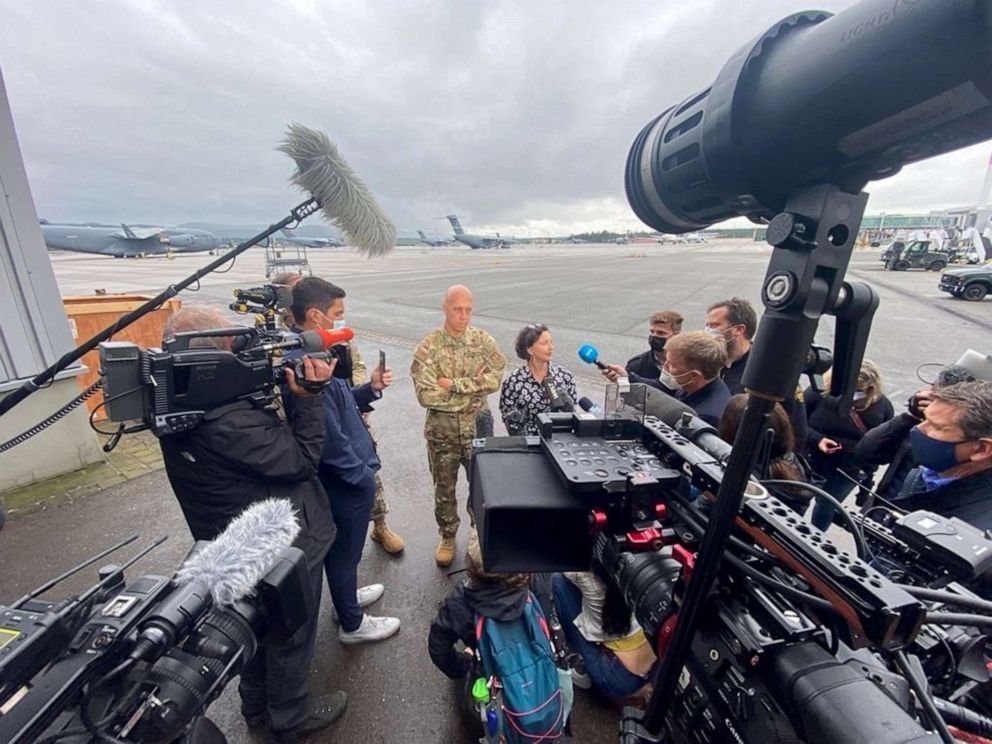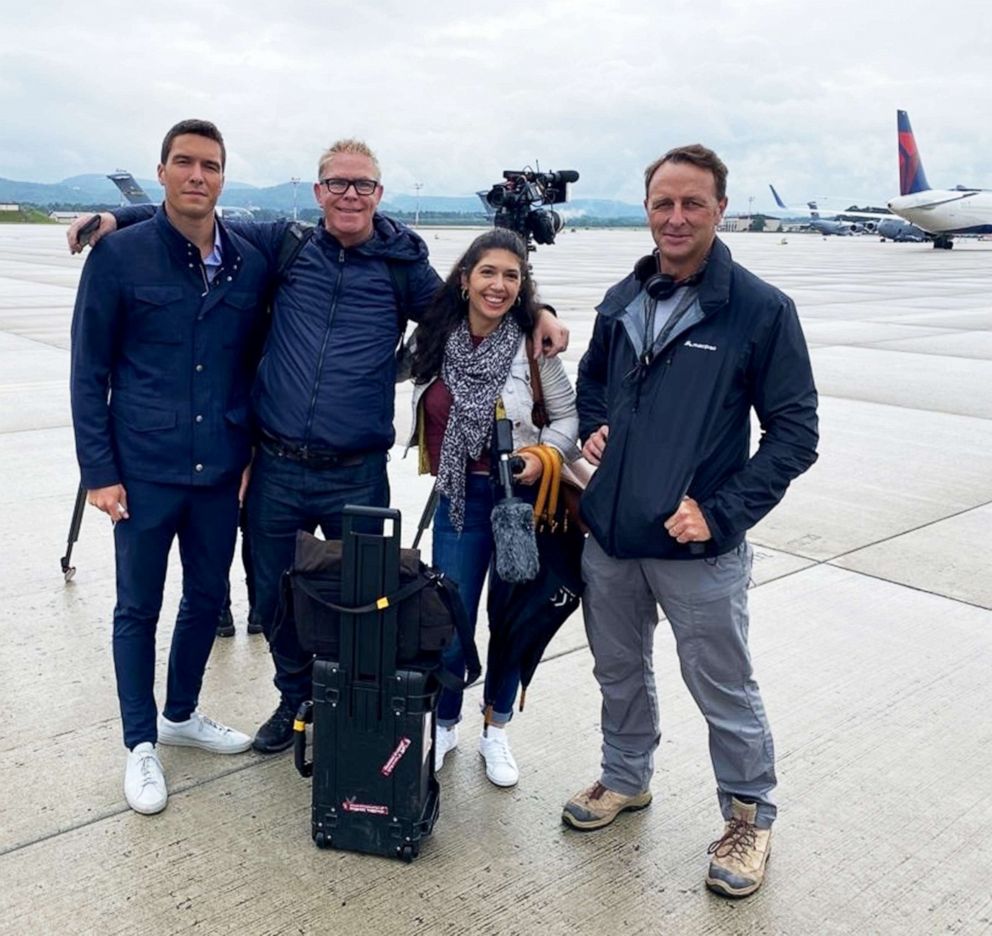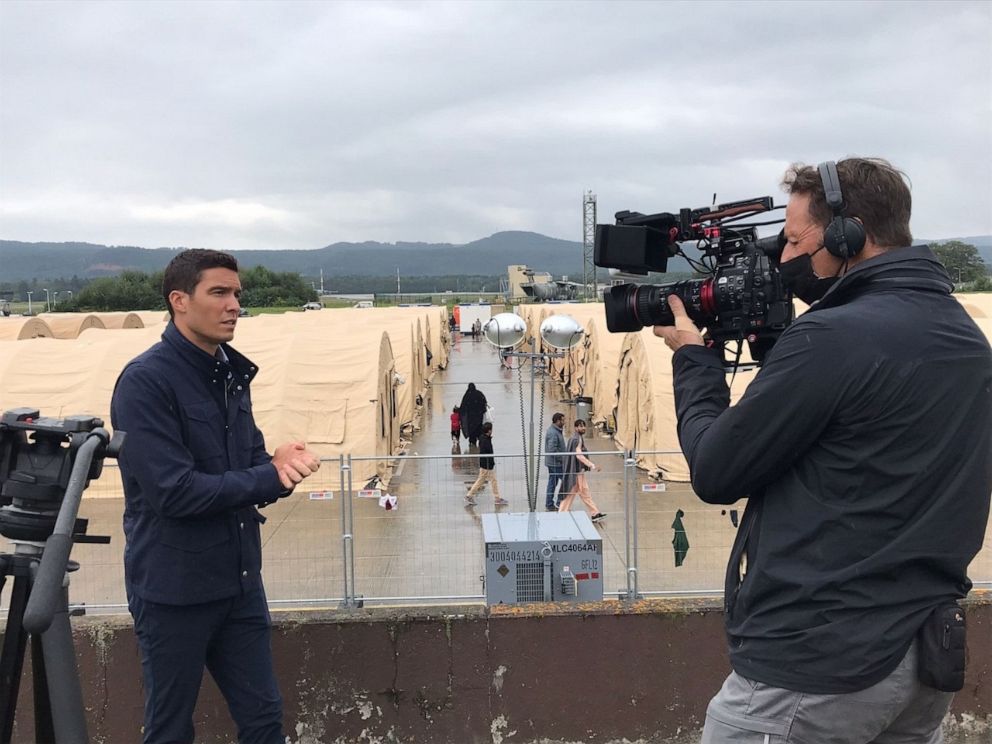Uncertain future awaits Afghan evacuees passing through Ramstein Air Base: Reporter's Notebook
Thousands of evacuees are making a stop in Germany before the U.S.
RAMSTEIN, GERMANY -- The part that got me was the silence. A low, damp sky hung over Ramstein Air Base as Afghan evacuees -- the lucky ones who made it through the chaos and carnage of Kabul and those last final yards, as the incomparable Ian Pannell has put it, between life and death at Hamid Karzai International Airport -- shuffled wordlessly out of the hangar.
They awaited final processing before climbing onto buses to drive them across the tarmac to the Delta and United jets that would take them to the United States.
It was so quiet, so efficient, so anathema to the scenes they had escaped. I got emotional wondering what they had seen, what they had fled and what they thought about the place -- and future -- ahead of them.
I asked those questions and more of one of the evacuees. Rafi, being identified by only his first name for his family's safety, came to Ramstein alone, a single refugee among the 20,500 that the 86th Airlift Wing Public Affairs Office had processed in Germany since Aug. 20 as of 7:30 a.m. local time Saturday. An Air Force spokesman told me that inbound flights are in a strategic pause; in English, that means, for now, more flights aren't coming in until the troops can ease the bottleneck of inflow versus outflow.
So far, almost 5,000 evacuees have departed on approximately 22 flights from Ramstein to various resettlement locations. There were five more such flights planned for Saturday. Rafi hoped to be on one. He also hopes his family in Kabul is still alive. He doesn't know. He went to the airport by himself, and has had no contact with his parents, siblings or other relatives. He said he's afraid they've been killed by the Taliban or will be, or suffer some other tragic fate.
Rafi's "optimistic" they'll be OK. He loves America; there's Wi-Fi there, he says, which he'll use to try to get in touch with his family. He didn't want to bother anyone with requests at Ramstein, because he knows they're busy. Rafi's heard a lot about Harvard University, and would like to study politics there. He showed me his right wrist; it had an orange administrative wristband and a pink scar from the bullet that grazed him outside the airport. His friend next to him at Ramstein didn't speak much English, but explained that his own thumb was swollen because someone from the Taliban had hit him with a stick.

Akmal, also only his first name, was a few feet down from Rafi in the same makeshift bullpen -- a holding area stacked high with snacks and bottled water. Akmal had done work for the Brits, and feared retaliation from the Taliban. He escaped Kabul with 16 family members. His young sons were enchanted by the squishy windsock on my handheld microphone. I asked Akmal what he thought about the United States; he said he's heard it's very big and beautiful and was excited to see it. He thinks it's a great country.
Military press officers led us on a tour around Ramstein for nearly three hours Saturday. We made stops at the processing tent where new arrivals get their papers checked and undergo biometric screening (but not COVID-19 tests, according to the lead medical officer Lt. Col. Dr. Simon Ritchie), the sprawling temporary living facility (rows of 440 khaki tents) and that cavernous hangar that's been hastily repurposed into a departures lounge of sorts.
It was hard to reconcile the static calm in front of us with the heaving frenzy in Kabul the world has been watching. Men queued for port-a-potties, some women tended to babies, children kicked soccer balls and strutted for our cameras. It felt a bit like purgatory. There's a strong chance their next stop won't be heaven. But at least they were free from hell.
Brig. Gen. Joshua M. Olson is the installation commander at Ramstein. He's tall and strong and competent and human. His concerns are myriad, primary among them the health and safety of everyone arriving on his base, including the U.S. service members wounded in Thursday's bombing in Kabul. An unspecified number are receiving care at the nearby Landstuhl Regional Medical Center.

"We are hitting close to our maximum," he told a gaggle of assembled press about arriving evacuees. "Hopefully this little bit of a pause right now in airflow will continue to give us a little bit of a chance to catch our breath and figure out what's going on."
He added that Ramstein will continue to receive evacuees "as the Department of Defense passes that down."
With the Aug. 31 withdrawal deadline looming, Olson would say only that his base will do whatever is asked of them as far as processing more arrivals. It's taken an immense emotional toll, he said, on him and his troops. To a person, every American and coalition service member we encountered was kind, helpful and tired.

For those departing, the mood matched the weather: temperate, but no longer raining. The worst, for now, is over. As the skies here brighten to something a little bit nicer than gray, flights out will continue.
Families like Akmal's will gather their things -- some lugged with them from Kabul, others given to them here on base -- and quietly, deliberately, walk onto a blue bus and sit with fellow Afghans like Rafi, alone and afraid. They will all get onto U.S. airliners and fly to the country that shaped their lives for so many years.
What has happened to them is complex and traumatic. What could have happened if they didn't get out may have been tragic, perhaps fatal. What happens to them next?




